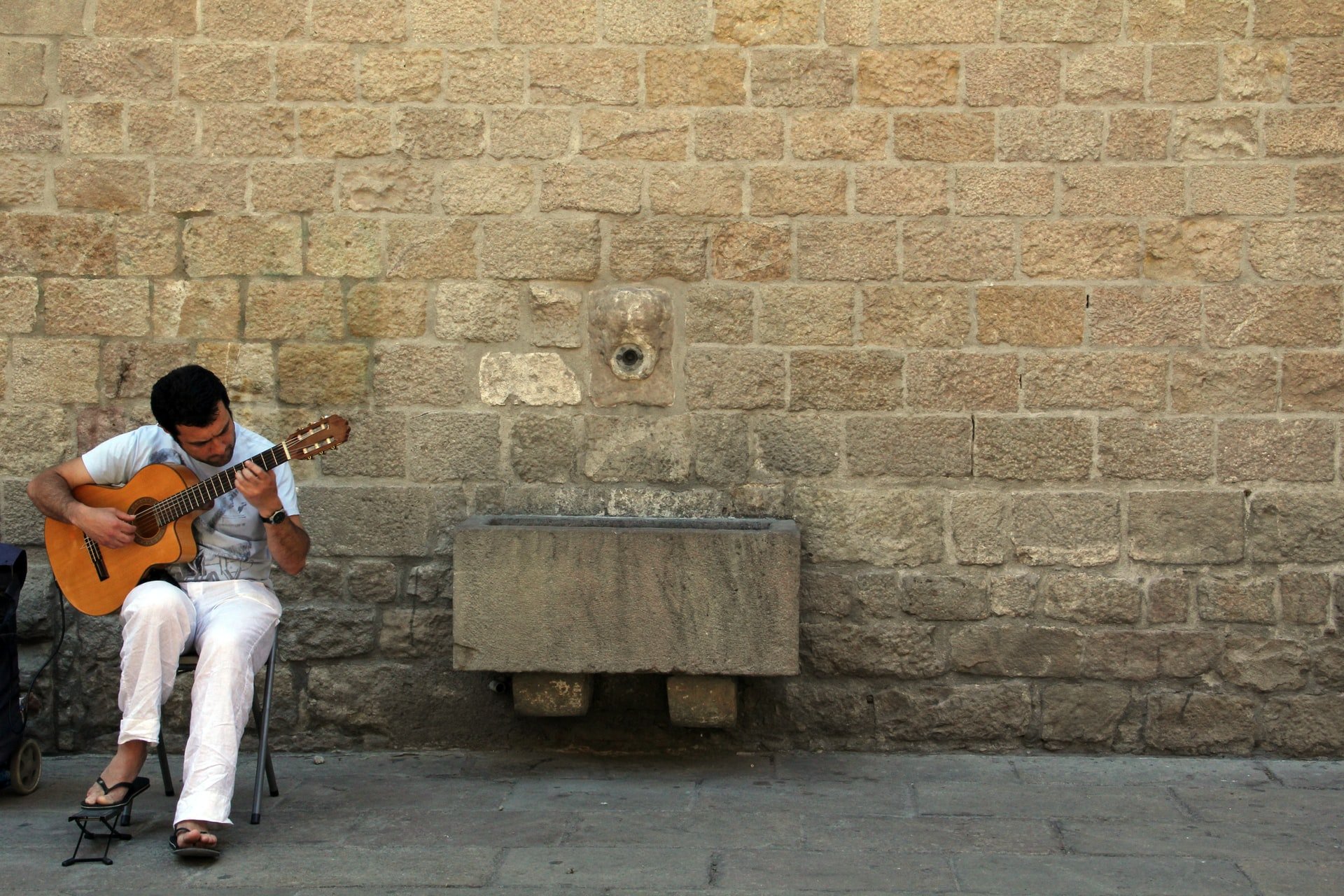When you learn Spanish, tricky Spanish verb pairs can be confusing. After all, who wasn’t at least once confused by different verbs that only translate into one word in English, such as ser or estar?
And what about those annoying cognates, such as moverse and mudarse? Is the Spanish verb asistir the same as the English verb to assist? Yes, Spanish verb conjugation can be complex —But don’t worry! Help is at hand!
There are many aspects of Spanish conjugation we could focus on, such as irregular verbs, future tense, false friends… These are all different ways to approach the same phenomenon. But you have to start somewhere, right? So, for now, let's focus on tricky Spanish verb pairs.
Pro Tip
By the way, if you want to learn Spanish fast and have fun while doing it, my top recommendation is Spanish Uncovered which teaches you through StoryLearning®.
With Spanish Uncovered you’ll use my unique StoryLearning® method to learn Spanish naturally through story… not rules. It’s as fun as it is effective.
If you’re ready to get started, click here for a 7-day FREE trial.
30 Tricky Spanish Verb Pairs

What are tricky Spanish verb pairs? Well, you may say that you have a tricky Spanish verb pair anytime you have two verbs that are easily confused.
There are a lot of possible reasons for that confusion: you can have a case of false friends or overlapping meanings, or maybe just verbs that do not exist in English and are difficult to understand at first.
Let me assure you: they are quite easy once you realize what the problem is. You just need a little practice!
Now let’s see some examples.
1. Ser/Estar
Ah, the ser/estar pair! This is, by far, the most hated pair by every student of Spanish.
The basic principle that differentiates these two verbs is that the ser is used for permanent states, and estar, for temporary ones. Some qualities are ambiguous about their durability, but many are quite clear.
Let’s think for a moment about tiredness. You are not always tired, right? You might feel you are, but the truth is you’re probably not. You’re tired just for a while until you get some rest. So, in Spanish, you would say Yo estoy cansado and not *Yo soy cansado.
You would use the verb ser to say your name, your nationality, and other permanent (or semipermanent) conditions. For example, after your graduation, you can say Yo soy arquitecta and not *Yo estoy arquitecta.
There are some ambiguous cases where a single word can refer to an essential quality of a person —that is, a permanent state— and at the same time be a temporary emotion.
Look at “happy,” for example. You can be a happy, joyous person by nature, or you can be circumstantially happy because something good happened.
That’s why you can say Yo soy feliz (because I’m a naturally happy person with a tendency for cheeriness) or Yo estoy feliz (because I just got a new fancy job and that makes me feel good).
2. Irse/Marcharse
The difference between irse and marcharse is quite simple. Both mean “to leave,” and both are what we call pronominal verbs, something that we can identify by the –se at the end.
These pronominal verbs have to be conjugated with a reflexive pronoun, that is, a pronoun that refers to the subject. Confusing? Let’s see how marcharse is conjugated in the present tense:
| Person | Pronoun | Verb |
| Yo | me | marcho |
| Tú | te | marchas |
| Él/Ella | se | marcha |
| Nosotros | nos | marchamos |
| Vosotros | os | marcháis |
| Ustedes | se | marchan |
| Ellos/ellas | se | marchan |
Let’s recap. Both irse and marcharse mean “to leave,” and both are pronominal verbs, so… what’s the tricky part?
Well, the thing is that most pronominal verbs have a form without the pronoun. Besides irse and marcharse, you have ir and marchar. And, in a lot of cases, the meaning can be very different between those two forms. To sum up, the problem looks like this:
- Marchar means the same as the English “to march,” but marcharse means “to leave.”
- Ir means the same as the English “to go,” but irse means “to leave.”
3. Acordar/Acordarse/Recordar

Here we have another case of a change of meaning between the regular and the pronominal form of a verb. Acordar means “to agree,” but acordarse means “to remember.” Do you know a synonym for acordarse? Recordar, that’s it!
In short:
- Acordar (algo): to agree (on something)
- Acordarse (de algo): to remember (something)
- Recordar (algo): to remember (something)
Let’s see some examples:
- Acordar (algo): Laura y yo acordamos que pagaremos el regalo a medias (Laura and I agreed on each paying half of the present).
- Acordarse (de algo): Ayer me acordé de que cuando era niña tenía un amigo imaginario (Yesterday I remembered that when I was a kid I had an imaginary friend).
- Recordar (algo): No recuerdo cuándo fue la última vez que fui a la playa (I can’t remember the last time I went to the beach).
4. Ser/Ir (Past Tense)
The Spanish verb ser again! He won’t leave us alone. Now, the thing is that ser (to be) and ir (to go) are irregular verbs.
This means that they change quite a bit when conjugated, to the point where they are barely recognizable. And, actually, in the past tense, ser and ir have the same form.
This conjugation table works for both ser and ir in the past tense:
| Pronoun | Verb conjugation | English translation |
| Yo | fui | I was/went |
| Tú | fuiste | You were/went |
| Él/Ella | fue | He/she was/went |
| Nosotros | fuimos | We were/went |
| Vosotros | fuisteis | You (plural) were/went |
| Ustedes | fueron | You (plural) were/went |
| Ellos/ellas | fueron | They were/went |
Yes, these two are exactly the same. So, how do we differentiate them? By context. For example:
- Ayer fui a la playa (Yesterday I went to the beach)
- Siempre fui un hombre muy curioso (I’ve always been a very curious man)
5. Mudarse/Moverse
In English, when someone changes houses, we say he or she “moves.” It’s the same word we use for actions related to movement in general. But in Spanish, we have two different verbs: moverse and mudarse.
Moverse is related to movement:
- Yo soy una persona muy inquieta, me muevo constantemente (I’m a very restless person, I’m constantly moving)
On the other hand, Mudarse means “to change houses:”
- Me mudo esta semana a un piso nuevo (I’m moving to a new apartment this week)
6. Recibir/Acoger/Obtener
These three verbs have similar meanings, so they can be a bit confusing Spanish learners.
Recibir means “to receive,” and has almost the same meaning as in English: to get or be given something, or to formally welcome someone.
On the other hand, acoger has a more restrictive meaning. It is used only when hosting someone; in that sense, it’s similar to one of the two meanings of recibir.
And obtener? Quite easy! It’s almost the same as “to obtain.” So with a gift, we would use recibir, but with something you asked for or deserve, you would say obtener.
7. Asistir/Atender
Here we have another case of false friends: Spanish verbs that look similar to English ones but don’t mean the same!
You can very well see that atender is almost identical to “to attend”… but its meaning is not. Atender means “to pay attention,” “to serve” or “to answer the phone.” It has some other meanings too, but the important thing is that it does not mean “to attend.”
On the other hand, you have asistir. In this case, the similarity is true, both in form and meaning: asistir means “to assist,” that is, “to help.”
But it also has another use. Asistir means… “to attend.” If you want to say “I attended all my classes this semester,” you’ll say: Asistí a todas mis clases este semestre.

8. Mantener/Apoyar/Soportar
These three verbs have very similar meanings. They all refer, in some way, to place, balance, and equilibrium, in both a literal and a metaphorical sense.
Mantener, for instance, means “to maintain,” “to remain” or “to keep,” and sometimes, “to financially support.”
- Por suerte, mantengo contacto con mis amigas del secundario (Luckily, I keep in touch with my high school friends)
- Con mi sueldo, mantengo a mi esposo y mis dos hijos (With my salary, I support my husband and my two kids)
For that reason, you’ve surely already guessed that soportar and “to support” are not exactly the same. In an engineering sense, they do have the same meaning:
- La viga soporta toda la estructura (The beam supports the entire structure)
But soportar it’s also similar to “to stand.” If you’re fighting with your brother, you can say:
- ¡No te soporto! (I can’t stand you)
That leaves us with apoyar. In a more concrete sense, it means “to put something against something;” it’s similar to “to place,” but it has a more unstable feel. In a metaphorical sense, apoyar also means “to emotionally support.”
- Apoyé el libro en la mesa (I put the book on the table)
- Juan estaba en un mal momento y necesitaba que lo apoyara (Juan was going through a bad time and neede my support)
9. Introducir/Presentar
Presentar means roughly the same as “to present,” so that should be no problem. The thing is that, in English, “to introduce” and “to present” are almost always synonyms or have very approximate meanings.
In Spanish, not so much. We don’t say introducir in the sense of “introducing two people”. Most times, introducir simply means “to insert” or, in a literary context, to introduce a topic or problem.
10. Saber/Conocer
Both saber and conocer could be translated by “to know,” but, in Spanish, they’re not equivalent. They’re both related to knowledge, but saber is used for facts, information or techniques, and conocer for places and people.
- Sé contar hasta diez en español (I know how to count to ten in Spanish)
- Conozco Japón (I’ve been to Japan)
- No conozco a la prima de José (I don’t know José’s cousin)
11. Preguntar/Pedir
This one is quite easy. Preguntar means “to ask questions”, and pedir, “to ask for something.”
- Pedro me preguntó mi edad (Pedro asked my age)
- Pedro me pidió cinco euros (Pedro asked for five euros)
12. Terminar/Acabar
Both terminar and acabar mean “to finish” or “to complete.” What is the problem, then? That terminar is not as intentional as “to terminate,” and doesn’t really mean to come in time or to make something end. Moreover, you can’t use it for employees or pregnancies, for example.
13. Aguantar/Soportar
As we have said before, soportar is similar to “to stand (someone or something).” Do you know what other verb means “to stand (someone or something)”? Yes, you’re right! Aguantar means exactly that.
- ¡No te soporto! (I can’t stand you!)
- ¡No te aguanto! (I can’t stand you!)

14. Meter/Poner
In Spanish, you’ll find a lot of verbs that could be translated as “to put”. This is the case with meter and poner.
What’s the difference between these two? Well, meter means “to put something inside something”, “to introduce”, while poner has a more general meaning, closer to “to put” or “to place something on something.”
- María metió su bolso en el maletero (María put her bag in the trunk)
- Dora puso el vaso sobre la mesa (Dora put the glass on the table)
Another difference is the pronominal use of both verbs. Meterse means “to get yourself into something;” while ponerse means “to wear” or “to put on.”
- Fede se metió en problemas (Fede got himself in trouble)
- Lucía se puso su vestido rojo (Lucía put on her red dress)
15. Tomar/Beber
This pair is interesting because part of the problem is rooted in Spanish variations.
As you know, there are a lot of different Spanish dialects. Words that mean something in one place can mean something different in another. And here we can see how that works with Spanish verbs.
Beber is easy because it always means “to drink.” But tomar… that’s a different story. In many Latin American countries, tomar means “to drink” (especially alcoholic beverages).
But in Spain, it means “to take”. This verb is also always used for some specific actions, such as tomar un baño (to take a bath) or tomar una foto (to take a picture).
16. Restar/Descansar
Welcome to another false friend case! Let’s see the accused: restar. It doesn’t mean “to rest” at all; in fact, it means “to subtract.” Do you want to say “to rest”? Just use descansar!
17. Suceder/Pasar
A native English speaker will be tempted to use suceder as an equivalent to “to succeed”, but he will not succeed doing that! Suceder has nothing to do with success. In fact, it just means “to happen.”
- ¡A que no adivinas lo que sucedió anoche! (Guess what happened last night!)
Pasar is similar. It also means “to happen”, but also “to go through”, “to pass by” and “to pass something”:
- Nunca me había pasado esto (This had never happened to me before)
- Pasé por tu casa, pero no estabas (I passed by your home, but you weren’t there)
- ¡Pasa la pelota! (Pass the ball!)
18. Hallar/Encontrar
Both hallar and encontrar mean “to find,” although most dialects use only one of these two verbs. In practice, they are synonyms, and they both have pronominal versions: hallarse and encontrarse (both meaning “to find one self”).
19. Tomar/Llevar
We’ve already discussed how tomar means “to take.” Well, I’m sorry to tell you, but it’s not always the case.
If you want to say you took someone somewhere, you’ll use llevar. That means that “I took a shower” is translated as Tomé una ducha, but “I took you home” is translated as Te llevé a casa.

20. Divertirse/Pasarlo Bien
Sometimes, instead of verbs, people use verbal phrases that work as synonyms of other verbs. This is the case of pasarlo bien, which means “to have a good time.”
It’s almost interchangeable with the actual verb divertirse, which most people translate by the verb phrase “to have fun” (Yes, Spanish speakers have a verb exclusively for having fun!).
Remember that divertirse has nothing to do with “to divert”—that’s a whole different story!
21. Dejar/Salir
In English, if you leave someone, you’re breaking up; if you leave something, you’re leaving it behind; and if you leave a place, you’re going away.
It’s not the same in Spanish, where you have two different verbs. Dejar means to leave something or to break up with someone. On the other hand, salir is only used for places; and it also means “to go out” (the opposite of breaking up with someone).
- Dejé a Mario (I left Mario)
- Dejé el libro sobre la mesa (I left the book on the table)
- Ya salí del edificio (I already left the building)
- Estoy saliendo con Manuela (I’m dating Manuela)
22. Realizar/Darse Cuenta
False friends are a nightmare, aren’t they? It seems there are hundreds of them! Believe me, it’s not so problematic, especially if you pay attention to cases like this.
Realizar doesn’t mean “to realize.” Yeah, what a shame. In fact, realizar is “to make” or “to do.” Otherwise, if you want to say “to realize”, you’ll have to use darse cuenta. Finally, the pronominal form realizarse means to find yourself or to feel complete.
- Martín realizó la encuesta (Martín completed the survey)
- Florencia se dio cuenta de que todo había sido una estafa (Florencia realized it had all been a scam)
- Me siento realizada (I feel complete)
23. Ver/Mirar
In English, we have three main verbs related to the act of seeing: “to look”, “to see” and “to watch”. In Spanish, we only have two: ver and mirar.
As you can imagine, it is difficult to make a rule that works in all cases (practice is your best ally here!). But we can say that, generally speaking, ver will be equivalent to “to see”, and mirar will be more similar to “to look” or “to watch”.
24. Llegar/Alcanzar
Both llegar and alcanzar are related to movement—and the end of movement—, but not in the same way.
Llegar can be translated by “to arrive”: it means to get to somewhere. On the other hand, alcanzar means “to reach” or “to pass,” but it’s not used with the meaning of “to arrive.”

25. Dejar/Parar
Dejar not only means “to break up with a partner”. It is also used in the sense of “to stop doing something.” But there is also another verb that is very similar to that English verb: parar. So what’s the difference between those two?
Well, here it gets a little tricky (but that’s our whole deal here, right?). We’ll have to get into prepositions. Dejar de and parar de are almost always synonyms. You use preposition de when you introduce another action, another verb.
- Él dejó de llamarme (He stopped calling me)
- Él paró de llamarme (He stopped calling me)
Things change when you remove the preposition. Without de, dejar means something very similar to “to leave” or “to abandon:”
- Andrea me dejó (Andrea left me)
While parar, without the de, has almost the same meaning, and is still very similar to “to stop”:
- Ella paró el tren (She stopped the train)
And finally, pararse means “to stand up:”
- Mi abuela se paró y se fue (My grandmother stood up and left)
26. Seguir/Continuar
In a lot of cases, seguir and continuar can be both translated by “to continue.” They mean the same thing: to restart a paused action. But seguir has an additional meaning—it’s also the equivalent of “to follow.” So be careful!
27. Salir/Irse
Both salir and irse refer to movement, but they do it in a slightly different way. Irse could be translated by “to go” or “to leave,” while salir is more similar to “to exit.”
28. Jugar/Tocar

Jugar and tocar are verbs related to executing a task or activity in some way. Jugar is very similar to “to play,” but, in Spanish, you can’t use it when speaking about music.
Instead, if you’re playing music, you should use tocar, which is generally translated as “to touch.”
- Yo juego al basketball (I play basketball)
- Yo toco la guitarra (I play the guitar)
29. Echar/Tirar
Both echar and tirar communicate the idea of “throwing”, although they do it in a slightly different way. Tirar is more forceful; you’ll use it when speaking about sports, for instance. When talking about people, in the sense of “kicking out”, you should always use echar.
30. Explorar/Recorrer
Explorar looks pretty straightforward: is very similar to the English verb “to explore.” On the other hand, recorrer condensates the meanings of “to travel”, “to wander”, “to walk around.”
Learning Tricky Spanish Verb Pairs Made Easy

So there you have it – 30 tricky Spanish verb pairs.
You’ve just seen a long list full of grammar and technicalities… a bit complicated, but not hard to incorporate if you do it right: using the StoryLearning® method for learning languages through stories.
This method is fun, easy, and it doesn’t require you to remember long lists of verbs. Instead, it uses actual stories to help you incorporate new concepts while actually using them.
You know what they say: practice makes perfect! Well, what are you waiting for? You can improve your Spanish right now with one of my courses. Don’t let anything stop you!

Olly Richards
Creator of the StoryLearning® Method
Olly Richards is a renowned polyglot and language learning expert with over 15 years of experience teaching millions through his innovative StoryLearning® method. He is the creator of StoryLearning, one of the world's largest language learning blogs with 500,000+ monthly readers.
Olly has authored 30+ language learning books and courses, including the bestselling "Short Stories" series published by Teach Yourself.
When not developing new teaching methods, Richards practices what he preaches—he speaks 8 languages fluently and continues learning new ones through his own methodology.










































